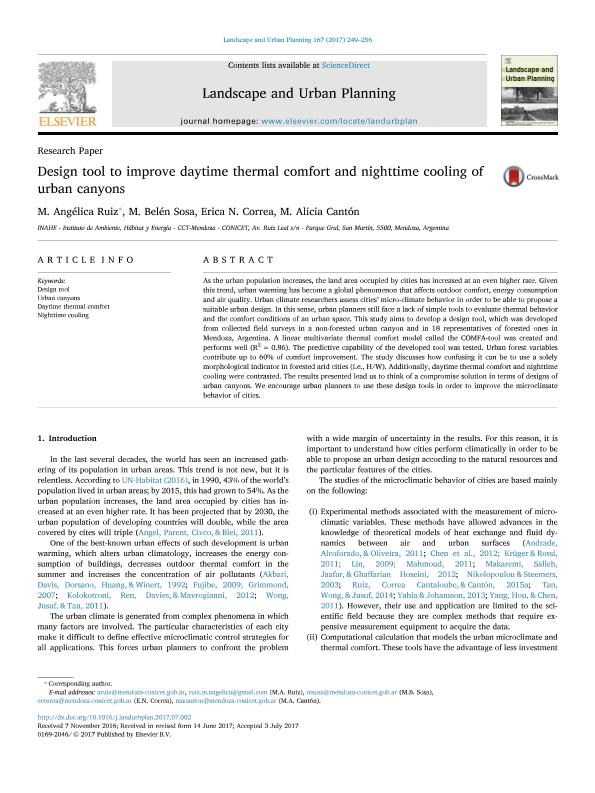Mostrar el registro sencillo del ítem
dc.contributor.author
Ruiz, María Angélica

dc.contributor.author
Sosa, María Belén

dc.contributor.author
Correa Cantaloube, Erica Norma

dc.contributor.author
Canton, Maria Alicia

dc.date.available
2018-08-30T23:03:19Z
dc.date.issued
2017-11
dc.identifier.citation
Ruiz, María Angélica; Sosa, María Belén; Correa Cantaloube, Erica Norma; Canton, Maria Alicia; Design tool to improve daytime thermal comfort and nighttime cooling of urban canyons; Elsevier Science; Landscape And Urban Planning; 167; 11-2017; 249-256
dc.identifier.issn
0169-2046
dc.identifier.uri
http://hdl.handle.net/11336/57842
dc.description.abstract
As the urban population increases, the land area occupied by cities has increased at an even higher rate. Given this trend, urban warming has become a global phenomenon that affects outdoor comfort, energy consumption and air quality. Urban climate researchers assess cities’ micro-climate behavior in order to be able to propose a suitable urban design. In this sense, urban planners still face a lack of simple tools to evaluate thermal behavior and the comfort conditions of an urban space. This study aims to develop a design tool, which was developed from collected field surveys in a non-forested urban canyon and in 18 representatives of forested ones in Mendoza, Argentina. A linear multivariate thermal comfort model called the COMFA-tool was created and performs well (R2 = 0.86). The predictive capability of the developed tool was tested. Urban forest variables contribute up to 60% of comfort improvement. The study discusses how confusing it can be to use a solely morphological indicator in forested arid cities (i.e., H/W). Additionally, daytime thermal comfort and nighttime cooling were contrasted. The results presented lead us to think of a compromise solution in terms of designs of urban canyons. We encourage urban planners to use these design tools in order to improve the microclimate behavior of cities.
dc.format
application/pdf
dc.language.iso
eng
dc.publisher
Elsevier Science

dc.rights
info:eu-repo/semantics/openAccess
dc.rights.uri
https://creativecommons.org/licenses/by-nc-sa/2.5/ar/
dc.subject
Daytime Thermal Comfort
dc.subject
Design Tool
dc.subject
Nighttime Cooling
dc.subject
Urban Canyons
dc.subject.classification
Ingeniería Medioambiental y Geológica, Geotécnicas

dc.subject.classification
Ingeniería del Medio Ambiente

dc.subject.classification
INGENIERÍAS Y TECNOLOGÍAS

dc.title
Design tool to improve daytime thermal comfort and nighttime cooling of urban canyons
dc.type
info:eu-repo/semantics/article
dc.type
info:ar-repo/semantics/artículo
dc.type
info:eu-repo/semantics/publishedVersion
dc.date.updated
2018-08-28T19:00:52Z
dc.journal.volume
167
dc.journal.pagination
249-256
dc.journal.pais
Países Bajos

dc.journal.ciudad
Amsterdam
dc.description.fil
Fil: Ruiz, María Angélica. Consejo Nacional de Investigaciones Científicas y Técnicas. Centro Científico Tecnológico Conicet - Mendoza. Instituto de Ambiente, Hábitat y Energía; Argentina
dc.description.fil
Fil: Sosa, María Belén. Consejo Nacional de Investigaciones Científicas y Técnicas. Centro Científico Tecnológico Conicet - Mendoza. Instituto de Ambiente, Hábitat y Energía; Argentina
dc.description.fil
Fil: Correa Cantaloube, Erica Norma. Consejo Nacional de Investigaciones Científicas y Técnicas. Centro Científico Tecnológico Conicet - Mendoza. Instituto de Ambiente, Hábitat y Energía; Argentina
dc.description.fil
Fil: Canton, Maria Alicia. Consejo Nacional de Investigaciones Científicas y Técnicas. Centro Científico Tecnológico Conicet - Mendoza. Instituto de Ambiente, Hábitat y Energía; Argentina
dc.journal.title
Landscape And Urban Planning

dc.relation.alternativeid
info:eu-repo/semantics/altIdentifier/doi/http://dx.doi.org/10.1016/j.landurbplan.2017.07.002
dc.relation.alternativeid
info:eu-repo/semantics/altIdentifier/url/https://www.sciencedirect.com/science/article/pii/S0169204617301640
Archivos asociados
